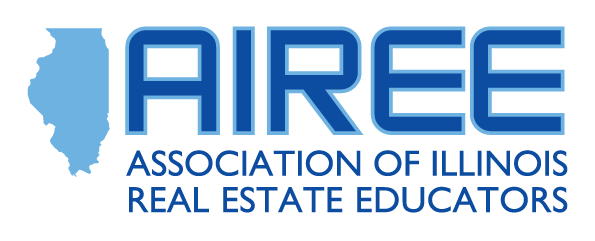- Home
- Beyond the Webinar: Advancing Your Skills in Asynchronous Online Real Estate Education
Beyond the Webinar: Advancing Your Skills in Asynchronous Online Real Estate Education |  |
For veteran real estate instructors who excel in the classroom or thrive in live webinars, the world of asynchronous online learning presents both a new challenge and a major opportunity. Delivering a self-paced, engaging course requires a fundamental shift in instructional design, especially when adhering to the strict regulations of the IDFPR DRE.
Moving beyond simply recording a live lecture, here are the three pillars for classroom instructors to advance their skillset and succeed in the asynchronous environment...
Pillar 1: Mastering Instructional Design for Engagement
Moving content online requires a profound shift from a teaching-centric model to a learner-centric design model. In a live classroom, an instructor's energy and immediate feedback drive engagement; online, the design itself must take over that role. This means moving away from simply recording a 60-minute lecture and uploading the video. Instead, break that hour into micro-learning modules, ideally no more than 5 to 10 minutes each. This prevents cognitive overload and aligns with adult learning principles. After each brief segment, immediately insert a required activity: a short knowledge check, a reflection prompt, or a case study analysis. This "content-then-application" loop forces active learning, ensuring the student is continually engaging with the material, not just passively streaming it. Your new role is not the primary deliverer of content, but the skilled architect of the learning experience.
| Classroom Mindset | Asynchronous Strategy: The "Redesign" | Key Tools to Learn |
| "I deliver content." (Focus on the lecture) | "I facilitate discovery." Break down 1-hour lectures into 5–10 minute micro-learning modules. Use text, video, and quizzes to introduce a concept, then immediately require a self-check activity. | Video/Audio Tools: Loom, Camtasia, or even a high-quality smartphone camera for short instructor-led intros. |
| "I handle questions live." (Focus on Q&A) | "I build community and clarity." Use mandatory discussion forums (IDFPR compliant) or virtual collaboration tools to prompt student-to-student interaction. Your role becomes summarizing discussions and providing targeted, high-value feedback. | LMS Features: Canvas, Moodle, or other Learning Management System (LMS) discussion and announcement functions. |
| "I assess with a final exam." (Focus on end result) | "I use frequent, low-stakes checkpoints." Integrate short, required quizzes or knowledge checks after every module to reinforce learning and provide immediate feedback. This is also key for compliance. | Interactive Content: Articulate Storyline, H5P, or simple quiz features built into your LMS. |
Pillar 2: Navigating IDFPR Compliance in Online Delivery
The most critical and unique aspect of Illinois real estate education is the strict regulatory requirement for proving that a student has actively engaged with and retained the material, particularly for Pre-License, Post-License, and CE credit. The IDFPR Division of Real Estate (DRE) focuses heavily on measurable interaction and assessment to ensure credit hours are earned effectively. This means that merely uploading videos or documents is not compliant. (If those were presented alone, the course would align more closely with a home-study course.)
| IDFPR Requirement | Asynchronous Compliance Strategy |
| Active Engagement (Proving Credit Hours) |
Integrate Mandatory Assessment Questions/Knowledge Checks. The primary method of compliance is frequent, required interactions throughout the course. This involves embedding knowledge checks or short, required quizzes after every module or video segment. Student progress must be blocked until these checks are successfully completed to ensure they are actively processing the content. |
| Identity Verification | Integrate Identity Checks. Beyond login security (usernames/passwords), you may decide to incorporate random knowledge checks or other identity verification tools to ensure the person registered is the one completing the course work. |
| Course Approval | Follow the Approved Curriculum Structure. You must apply to have the new delivery method approved, ensuring your online structure matches the IDFPR-approved curriculum outline. |
| Final Exams | Proctoring Requirements. Understand if a course requires a proctored final exam. If so, it may be necessary for your course delivery platform to integrate with an approved online proctoring service. |
Pillar 3: An Educator's Professional Development Path
To successfully make this transition, consider focusing your own professional growth in these specific areas:
- Learn a Learning Management System (LMS): Become proficient in the platform your organization uses. This is where all compliance tracking and student interaction lives.
- Investigate Certifications: Look for courses or certifications in Instructional Design or eLearning Development. For example, check out the Certified Distance Education Instructor (CDEI) program. These courses teach the principles of chunking content and writing effective learning objectives.
- Embrace AI for Efficiency: Utilize generative AI tools not to write your content, but to refine your language, draft quiz questions, or summarize complex legal texts into plain language for student handouts.
- Focus on the "Why": Your new role is to ensure clarity, consistency, and a sense of instructor presence through thoughtful course announcements and timely feedback.
Conclusion
The transition to asynchronous teaching is a challenging but rewarding professional journey. By prioritizing robust instructional design, dedicating time to master your Learning Management System (LMS) technology, and staying meticulously focused on IDFPR compliance checks, you ensure that your courses are not only approved but are also highly effective learning tools.
Your commitment to evolving your delivery methods is what ultimately strengthens the entire Illinois real estate profession, providing the next generation of licensees with the flexibility they need to succeed.
